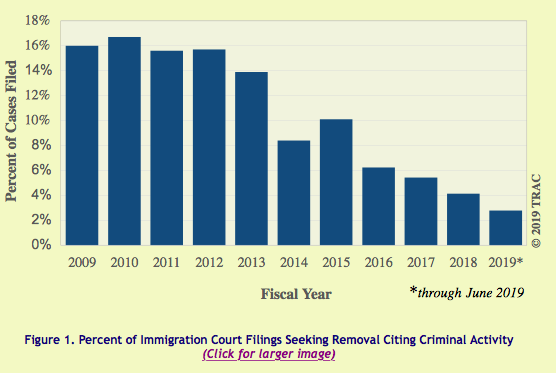Trump is not going after criminals
Read more about InAlienable.Support Quixote Center’s InAlienable program!
InAlienableDaily Dispatch
July 22, 2019
When Trump announced that his administration would begin deporting “millions” of immigrants earlier this month, he defended this as an action targeting criminals:
“We’re really looking for criminals as much as we can. Trying to find the criminal population, which has been coming into this country the last 10 years,” Trump told reporters as he prepared to depart Washington. He touted his administration’s removal of members of the violent gang MS-13, claiming he’d deported them “by the thousands.”
In doing so, Trump was elevating a theme he has focused on since the early days of his campaign. His administration would focus on the “bad hombres,” the "rapists and murderers" coming through Mexico to threaten U.S. American lives and livelihoods. His administration established a hotline for people to report if they had been victims of a crime involving a “nexus with immigration.” The hotline received mostly prank calls during its first year of operation and has been controversial from the start:
Douglas Rivlin, a spokesman for the immigrant advocacy group America’s Voice, said the hotline was set up because Trump “wanted to be able to say he was addressing the fictitious immigrant crime-wave he has conjured from his anti-immigrant fever dreams.”
The rhetorical focus on criminality is intended to both garner fear and legitimate expanded enforcement operations as his administration has set record highs in the number of people detained - though he still lags behind Obama’s administration in actual deportations. It also plays into the policy at the border where administration officials repeatedly claim asylum seekers are mostly just gaming the system.
In reality Trump’s administration has deemphasized criminal activity as the basis for removal proceedings in immigrant courts more than any administration. In the current fiscal year, DHS has only sought removal based on a criminal act in 2.8 percent of all immigration court filings. That is an extraordinary drop from the 25 percent of cases in 1999, or even the 16 percent of cases in 2009. In some courts, the numbers hover around 0.1 percent - or one in a thousand cases. In Houston, the second busiest immigration court in the country, the number of criminal removal cases was the lowest, five out of 15,063 cases heard, or 0.033 percent.

The decline in the rate is not simply a function of more arrests - the actual number of filings is also way down:
Despite the rising number of ICE interior arrests and individuals who are detained, fewer and fewer immigrants in the Immigration Court's growing workload are being cited as deportable based upon criminal activity. During the first nine months of FY 2019 only 7,458 cases have been lodged by DHS citing criminal activity as a basis for seeking the removal order. If this same pace continues for the remaining three months of the year, the total is still unlikely to reach 10,000. A decade or more ago immigrants with criminal records or alleged criminal activity involved 30,000 to 40,000 court filings each year.
There is a tremendous amount of variability in the courts. Though, as explained by TRAC, even courts that are based in detention facilities, are at record lows of criminal removal proceedings:
Not surprisingly given standards for mandatory detention, Immigration Courts hearing cases at ICE detention facilities often have higher proportions of individuals where DHS cites alleged criminal activity as a basis for seeking removal. But even here immigrants make up a small minority of the court's docket. For example in Tacoma, Washington which handles cases at the Northwest Detention Center only one in ten cases (10.3) this year cite criminal activity as a basis for seeking the immigrant's removal. At Miami-Krome, the proportion rises to one out of eight (12.1%). Higher proportions, however, are observed at two Immigration Courts - York and Napanoch - which hear cases at prisons involving immigrants who have been convicted of crimes for which they are serving prison terms.
The focus on immigrant criminality as a means to justify expanded enforcement operations is not new with this administration. Obama also shifted his focus to criminal removals, and despite the relatively low numbers during his administration of criminal removal proceedings, he is perceived as having focused his deportation machine on people with criminal records. But Trump has elevated this rhetoric to a fever pitch despite numerous studies that show immigrants commit crime at a lower rate than native born citizens in the U.S. - this includes unauthorized immigrants. The tragedy here is that those who support this administration’s crackdown on immigrants believe the rhetoric of criminality, even though that is not even the real focus for removal proceedings. This administration is seeking to detain and remove anybody they can, breaking up families in the process and destroying thousands of lives. As with much else they do, the justification is a lie.

Comments
Daily Dispatch ... (not verified)
[…] referred to immigration courts following completion of sentences for criminal convictions. We reported on this in July – and the fall off is […]